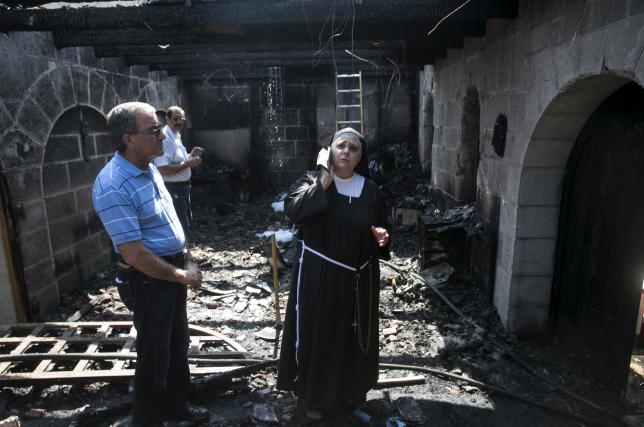Burning of biblical church in Israel an 'attack on us all'—Israeli PM

Israeli Prime Minister Benjamin Netanyahu condemned the arson attack on a church on the shore of the Sea of Galilee as "an attack on us all." The Church of the Multiplication of the Loaves and Fishes in Tabgha is the site where Christians believe Jesus performed a miracle by feeding 5,000 people with five loaves of bread and two fish.
The attackers started a fire at the limestone church, which is attached to a Benedictine monastery, 120 miles north of Jerusalem, injuring two people and leaving the place of worship in ruins.
The church was built in the 1980s on the site of 4th and 5th century churches, the Catholic News Agency reported.
Netanyahu denounced the attack, saying "in Israel freedom of worship is one of our core values and is guaranteed under the law. Those responsible for this despicable crime will face the full force of the law. Hate and intolerance have no place in our society."
He was joined by Israeli president Reuven Rivlin, who said that "such terrible desecration of an ancient and holy place of prayer, is an attack on the very fabric of life in our country. Israel, as a state and a society, is obligated to protect and preserve the holy sites, for all faiths."
"The torching of the church is a cowardly and despicable act which contradicts Israel's basic values," Internal Security Minister Gilad Erdan said in a statement, according to NBC News.
Those who attacked the Church of the Loaves and Fishes spray-painted Hebrew graffiti on the walls, reading "all idols will be smashed," suggesting the attackers were Jewish extremists.
The graffiti reportedly is from the "Aleinu" prayer, prayed thrice a day during Jewish services.
The arson injured a monk and a staff member who were hospitalised due to smoke inhalation.
"There is a real escalation in anti-Christian violence: from a small fire which leaves little damage, to a bigger fire, and finally to an arson attack which is intended to produce major damage and even killing," said Bishop William Shomali, Auxiliary Bishop of the Patriarchate of Jerusalem. "We are allowed to ask: What will come next?"
Fr. Jamal Khader, rector of the Patriarchate of Jerusalem's seminary in Beit Jala, aired a similar sentiment, saying the arson could have been prevented if officials took previous attacks seriously.
"We had incidents including at Tabgha and Dormition Abbey where Israeli authorities didn't do enough to stop them, so we expected such a crime and this may continue if the authorities don't take concrete steps to stop it, to show they are serious in protecting the holy places in the Holy Land," he said.
Jewish extremists in April destroyed crosses in the monastery's outdoor prayer area and threw stones at those who came to worship.
"I am still inclined to think that the act is perpetrated by a very small and aggressive group," Bishop Shomali said. "I cannot put all Israelis in the same basket, since there are the liberal and tolerant Jews, those who are less, and finally those who hate the non-Jews. My fear is that these radicals are increasing in number and in the degree of intolerance."
Fr. Peter Vasko, OFM, president of the Franciscan Foundation for the Holy Land, said: "At this moment all we can do is to forgive those who committed this crime and to somehow rebuild again as we try to practice the gospel values that our Lord taught us."











